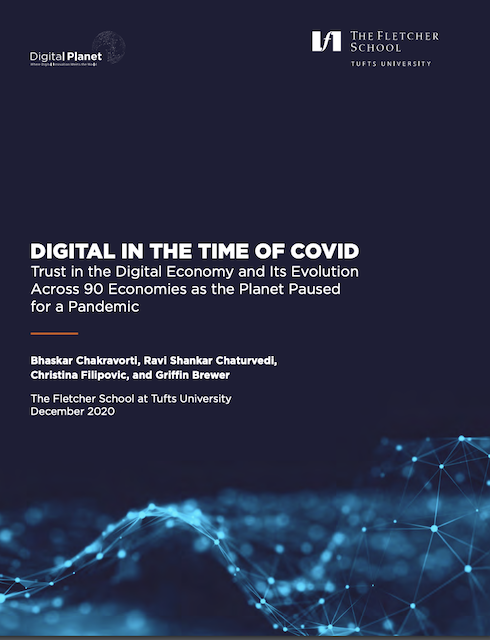Last February, I figured out that if the coronavirus disease 2019 (Covid-19) outbreak lasts longer, it is best to prepare a longer-term shift to remote work. Before the pandemic hit the Philippines, I could already see how it changed the way of life in China and how major hubs, technology companies could seize this opportunity for growth, and for better internet and online services. I even thought that it is time to conduct a work-from-home experiment in Metro Manila to check if servers could handle household demand. Despite the disruption triggered by the pandemic, one trend emerged: digitalization helped people work, learn, shop, and socialize safely during the pandemic and hold on to some normalcy.
The Digital Intelligence Index unveiled by the Fletcher School at Tufts University, in partnership with Mastercard, delineates the progress economies have done in advancing their digitalization, fostering trust and integrating connectivity into the lives of billions. Bhaskar Chakravorti, dean of Global Business at Fletcher, reported, “The pandemic may be the purest test of the world’s progress towards digitalization. We have a clearer view on how dynamic digital economies could contribute to economic resiliency during a time of unparalleled global turmoil and could be positioned for recovery and change.”
Over 358 indicators are combined in two scorecards: Digital Evolution and Digital Trust. The Digital Evolution framework segments 90 economies into four zones: Stand Outs, Stall Outs, Break Outs and Watch Outs. The report shows the Philippines as an economy to watch out for. While the Philippines have infrastructure gaps, young people are showing enthusiasm for a digital future with increased use of social media and mobile payments.

Several Watch Out economies such as Brazil, Colombia, Mexico and the Philippines, display highly engaged behavior. This is a potential bright spot for technologists, policymakers and market leaders to transform this demand into future growth.
Within the Stand Out segment, South Korea, Singapore and Hong Kong maintain a high absolute score and fast digital momentum. Consistent top performers in the Index are New Zealand, Estonia, Taiwan and the United Arab Emirates, who showed adaptability to change, and institution-led support for innovation. Surprisingly, the United States scores second after Singapore in digital evolution. Stall Out economies in Asia Pacific are Australia, New Zealand and Japan. Known for being mature digital economies, they have a high state of digital adoption despite slowing digital momentum. They trade off speed for sustainability and are typically invested in expanding digital inclusion and building robust institutions. Break Out economies in Asia Pacific include mainland China, India, Vietnam, Indonesia and Thailand. These are evolving rapidly and significant headroom for growth that is attractive to investors.
The Digital Trust scorecard covers a smaller group of 42 economies and encompasses four key drivers: environment, experience, behavior and attitudes. These measures deal with the trustworthiness of the digital ecosystem in each economy, the level, and types of friction in digital experiences, the depth of engagement among internet users, and level of trust in the digital ecosystem expressed by citizens. Economies such as Singapore, Hong Kong Special Administrative Region, Taipei and South Korea provide citizens with a near seamless experience, delivering the holy grail of advanced infrastructure, broad access and unparalleled interaction. This experience is also matched by high levels of engagement, offering these economies a clear advantage in a “beyond access” future. Economies such as mainland China, Indonesia and Vietnam have increasingly favorable attitudes about their digital future, supported by an expanding digital adoption and opportunity.
Indeed, Asia Pacific’s economies are more digitally trusted and resilient. Matthew Driver, Mastercard’s executive vice president for services for Asia-Pacific, said, “Covid-19 has advanced digitalization across Asia Pacific by at least five years in as many months, only serving to further accelerate the development of the digital ecosystems across the region.
With rising levels of consumer trust and engagement and growing digitization in the small business segment, all deeply supported by proactive enabling actions from governments, the opportunities ahead for the region’s digital economy are immense. With Asia Pacific poised to recover quickly from the pandemic, the strong performance in the two components of Digital Evolution and Trust will only serve to further support Asia’s leadership in digital.”
Meanwhile, the Philippines could learn from this report and narrow the infrastructure gaps.
The full report and methodology can be found here
https://sites.tufts.edu/digitalplanet/digitalintelligence/
First published at Sunday Business & IT on December 20, 2020